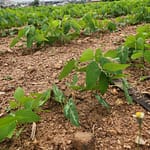In the face of Nigeria’s worsening climate crisis, shrinking natural resources such as arable land and water, land degradation, and insecurity are fueling a national food crisis. With over 19.5 million people projected to face food insecurity in 2025, farmers are increasingly looking toward nature-based solutions to restore soil health, improve yields, and build resilience.
Gambo Bako, a cereal and legume farmer in Kuje Area Council, Abuja, spoke to LIDA Network about the impact of weed infestation and limited farming access: “This land has been under cultivation for more than fifty years. Insecurity in Nigeria does not allow farmers to rotate their lands as it used to be in shifting cultivation in the olden days.”

The repeated use of land also known as monocropping leads to significant depletion of soil nutrients such as nitrogen, phosphorus, and potassium. In fact, studies by the International Fertilizer Development Center (IFDC) show that more than 70% of Nigerian farmland suffers from nutrient depletion, leading to reduced yields and increased vulnerability to pests and diseases.
A Climate Smart Solution to increase agricultural yield
Among the most promising climate-smart crops gaining attention is Mucuna pruriens, commonly known as velvet bean. This underutilized legume, long recognized for its soil- enriching properties, is now experiencing a renaissance as a powerful tool for land restoration, sustainable agriculture, and climate adaptation.
To address declining yields and soil fertility, the International Institute of Tropical Agriculture (IITA) is promoting Mucuna as a maintenance, non-edible legume capable of fixing nitrogen into the soil at higher rates than cowpea, a more commonly used legume.
Mucuna the Natural Soil Builder
Mucuna is a vigorous, fast-growing legume cover crop that provides immense agronomic and environmental benefits. When fully grown, its canopy blocks sunlight, effectively suppressing weeds, one of the biggest production challenges for smallholder farmers.
At its core, Mucuna is a biological nitrogen fixer. Its root absorb nitrogen from the atmosphere and convert it into a plant-usable form. Mucuna can fix between 60 to 150 kg of nitrogen per hectare, significantly reducing dependence on synthetic fertilizers.
Synthetic fertilizers, while useful, are expensive and contribute to greenhouse gas emissions notably nitrous oxide, which is 300 times more potent than CO₂. Additionally, excessive fertilizer runoff contributes to water pollution in rivers and streams.
In Nigeria where over 90% of farmers do not apply fertilizer at recommended levels due to cost and access Mucuna presents an affordable, environmentally friendly alternative.
A Smart Agriculture solution to Land Degradation and Farmer Herder Conflict
According to Nigeria’s Federal Ministry of Environment, an estimated 35% of the country’s land is degraded, with desertification advancing at 0.6 km per year in some northern states. This environmental strain combined with limited arable land and shrinking water bodies has intensified farmer-herder conflicts, now responsible for thousands of deaths and mass displacement annually.
Mucuna, by restoring the fertility of degraded plots, reduces the pressure to open new lands, thereby providing a conflict-sensitive solution in areas where competition for land fuels insecurity. Restoring soil in previously used areas allows some lands to be repurposed or temporarily shared, easing the burden on both farmers and pastoralists.
Recognizing the potential of Mucuna in land restoration, researchers from the International Institute of Tropical Agriculture (IITA), headquartered in Ibadan with a strong presence in Abuja, have intensified efforts to study and scale its use. IITA is conducting extensive trials and partnerships with local farming communities to promote Mucuna as part of integrated soil fertility management systems.
In Abuja and other test locations, IITA’s research has shown that plots interplanted with Mucuna exhibit improved crop performance in subsequent planting seasons, better soil moisture retention, and enhanced organic matter. These findings reinforce the crop’s potential as a land regeneration tool, especially in fallow or abandoned lands that have suffered years of neglect.
The Weed Suppressant
One of the most striking benefits of Mucuna is its ability to act as a natural weed suppressant. On Young African Leaders Initiative, Abuja Hubs visit to the International Institute for Tropical Agriculture in Abuja, we saw in practice, how Mucuna was being used as a soil regenerative natural method to restore nitrogen in the soil before the next farming season. Akinola Oyedele, a researcher at the institute described its benefits while stressing its high demand by farmers across the country.
He emphasised that they inhibit the growth of surrounding undesirable plants. In a country like Nigeria, where over 70% of farmers operate on small plots and weed control remains a major production challenge, integrating Mucuna into farming systems can yield transformative results.
Responding to Rising Demand
Driven by its wide-ranging benefits, demand for Mucuna is on the rise in Nigeria and beyond. While still relatively under-commercialized, forward-looking farmers and agricultural cooperatives are beginning to incorporate Mucuna into their annual crop plans. Some are using it before planting cereals like maize or sorghum, while others are adopting it during fallow periods to rejuvenate exhausted fields.
However, access to quality Mucuna seeds remains a limiting factor. This is where institutions like IITA play a pivotal role not only in seed multiplication and dissemination but also in training farmers on the best practices for cultivating and integrating Mucuna in different agroecological zones.
Through collaborations with development organizations, private sector actors, and government agencies, Mucuna is being repositioned as a strategic crop for climate adaptation. The current momentum presents an opportunity to scale its benefits nationally and even regionally through the African Continental Free Trade Area (AfCFTA), especially in line with Nigeria’s Climate Change Act and national soil health restoration initiatives.
Toward Climate-Resilient Farming Systems
Nigeria’s agricultural future depends not only on increasing yields but on doing so sustainably and equitably. Mucuna embodies the principles of climate-smart agriculture: it mitigates greenhouse gas emissions by reducing fertilizer use, adapts to climate stresses through erosion control and water conservation, and enhances productivity by improving soil health and reducing input costs.
For smallholder farmers, many of whom are women, the cultivation of Mucuna offers a pathway to long-term land stewardship and economic empowerment.












